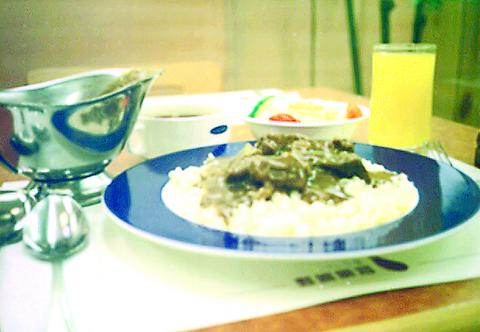Few Japanese chain restaurants have succeeded in Taiwan like Aubergine. Friday through Sunday evenings, you'll probably have to wait at least 30 minutes to get one of the small cafe tables at either of the two Taipei locations. Last time I was there, I ran into a Japanese expatriate who has been living in Taipei for seven years. "I've been to a lot of Japanese curry places since I've been here, and this one's really pretty good," he said.
He eats there fairly often, and from talking to the manager, who easily picked out the regulars, greeting some as they walked in, I gathered that he's not alone. The reason, as with any chain restaurants, is consistent application of a successful formula.
The curry is thick, which is typical of Japanese curry, and comes in five levels of spiciness. These five grades are actually made by the measured mixing of two master batches, one mild (level 1) and one very spicy (level 5).

PHOTO: DAVID FRAZIER, TAIPEI TIMES
For the basic set, there are six options: beef, pork, chicken, vegetable, cheese (all NT$220) and seafood (NT$260). The meats are of good quality and are mixed with the curry just prior to serving.
The menu offers an interesting and heavily annotated history of curry. The trail begins with the British East India Company in the 17th century, which exported curry back to Europe and then eventually on to the outwardly receptive Meiji Japan in the 18th century, where it was first consumed as a delicacy before becoming relatively common fare.
Sets include a decent side of green salad, a good cup of onion soup, a plate of butter rice and a choice of beverages that includes small glasses of real mango or grapefruit juice in addition to the standard coffee or tea. Except for a few premium meats -- roasted short ribs (NT$500/set), BBQ baby back ribs (NT$450/set) and roast chicken terriyaki (NT$430/set) -- the menu pretty much ends there. Beverages are reasonable, with Taiwan beer at NT$60 and Japanese beer at NT$70.
The only complaint I've ever heard about Aubergine is that the vegetable curry is a little bit less than a bellyfull, a problem the other sets don't have, especially if you pay NT$20 extra for a strip of melted gouda cheese across the top.
Japanese curry is rather like hamburgers, a food genre that can be really good but is limited by being forever common.
But what makes Aubergine uncommon in Taipei is the lack of genuinely good competition. That's why it stands out. That's why you'll have to leave your cell phone number with the maitre d' and browse shops for a while as you wait half an hour for a table on any weekend or holiday.

This year will go down in the history books. Taiwan faces enormous turmoil and uncertainty in the coming months. Which political parties are in a good position to handle big changes? All of the main parties are beset with challenges. Taking stock, this column examined the Taiwan People’s Party (TPP) (“Huang Kuo-chang’s choking the life out of the TPP,” May 28, page 12), the Democratic Progressive Party (DPP) (“Challenges amid choppy waters for the DPP,” June 14, page 12) and the Chinese Nationalist Party (KMT) (“KMT struggles to seize opportunities as ‘interesting times’ loom,” June 20, page 11). Times like these can

June 23 to June 29 After capturing the walled city of Hsinchu on June 22, 1895, the Japanese hoped to quickly push south and seize control of Taiwan’s entire west coast — but their advance was stalled for more than a month. Not only did local Hakka fighters continue to cause them headaches, resistance forces even attempted to retake the city three times. “We had planned to occupy Anping (Tainan) and Takao (Kaohsiung) as soon as possible, but ever since we took Hsinchu, nearby bandits proclaiming to be ‘righteous people’ (義民) have been destroying train tracks and electrical cables, and gathering in villages

Dr. Y. Tony Yang, Associate Dean of Health Policy and Population Science at George Washington University, argued last week in a piece for the Taipei Times about former president Ma Ying-jeou (馬英九) leading a student delegation to the People’s Republic of China (PRC) that, “The real question is not whether Ma’s visit helps or hurts Taiwan — it is why Taiwan lacks a sophisticated, multi-track approach to one of the most complex geopolitical relationships in the world” (“Ma’s Visit, DPP’s Blind Spot,” June 18, page 8). Yang contends that the Democratic Progressive Party (DPP) has a blind spot: “By treating any

Swooping low over the banks of a Nile River tributary, an aid flight run by retired American military officers released a stream of food-stuffed sacks over a town emptied by fighting in South Sudan, a country wracked by conflict. Last week’s air drop was the latest in a controversial development — private contracting firms led by former US intelligence officers and military veterans delivering aid to some of the world’s deadliest conflict zones, in operations organized with governments that are combatants in the conflicts. The moves are roiling the global aid community, which warns of a more militarized, politicized and profit-seeking trend